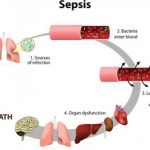It is sepsis awareness month, a time when unknowing people are educated about this life-threatening condition that affects so many. It is estimated that every two minutes, someone dies from sepsis in the U.S.—this is more than prostate cancer, breast cancer, and AIDS combined. Sepsis is a toxic or severe response to an infection that can cause urosepsis, heart damage, and eventually lead to septic shock, which can cost you your life. We have also included new information about sepsis survival chances that may increase with obesity but has its own set of risks.
 Urosepsis in elderly: Causes, symptoms, and treatment
Urosepsis in elderly: Causes, symptoms, and treatment
Urosepsis is a combination of medical terms urology, the function of the urinary system, and sepsis, a life-threatening bacterial infection. Urosepsis is a severe infection that is localized in the urinary tract and has the potential to be fatal.
The urinary tract consists of the kidneys, ureters, bladder, and urethra. The job of the kidneys is to filter blood, extracting all waste products from the urine. When an infection of this system occurs, it can lead to many of the symptoms associated with a urinary tract infection. If it is not remedied in a prompt manner, the infection may travel up the urinary tract to the kidney. This leads to further infection and the development of urosepsis, which is when the infection reaches the bloodstream. Continue reading…
 Heart damage, myocardial dysfunction, in sepsis, researchers identify cause
Heart damage, myocardial dysfunction, in sepsis, researchers identify cause
Advertisement
Researchers identified the cause of heart damage, myocardial dysfunction, in sepsis. Myocardial dysfunction can be a common complication of septic shock – blood poisoning with low blood pressure. Researchers from the University of Liverpool’s Institute of Infection and Global Health have uncovered the cause of heart damage in septic shock.
The researchers found that histones – nuclear proteins – cause heart damage when they are released into blood circulation after cell damage from sepsis. Histone levels are biomarkers that can help predict which patients are at a higher risk for heart complications. Continue reading…
 Influenza and severe sepsis link, experts describe warning signs of sepsis and septic shock
Influenza and severe sepsis link, experts describe warning signs of sepsis and septic shock
There is a link between influenza and severe sepsis where experts describe the warning signs of sepsis and septic shock in order for you to prevent the complication from occurring to you.
Influenza, or the flu, is caused by a viral infection which mainly affects the respiratory tract and not the digestive system – even though you may have heard the term stomach flu, it isn’t really the flu.
Influenza may progress to a serious condition known as sepsis. Sepsis is the body’s, often deadly, response to an infection or injury and can sometimes be referred to as blood poisoning. Continue reading…
 Sepsis, bacteremia and the risk of septic shock (life-threatening low blood pressure)
Sepsis, bacteremia and the risk of septic shock (life-threatening low blood pressure)
Sepsis and bacteremia increase the risk of septic shock, which leads to life-threatening low blood pressure. Sepsis is a potentially life-threatening complication of an infection that occurs when chemicals are released into the blood stream to fight off infection, triggering inflammatory responses through the body. This inflammation can lead to many changes that can result in organ damage and failure.
When sepsis progresses to septic shock it triggers severely low blood pressure, which can lead to death.
Sepsis is most commonly found in older adults, although it can affect anyone. If sepsis is treated early with antibiotics, recovery and avoidance of complications is possible. Continue reading…
 Sepsis survival chances improve with obesity, but risks still outweigh benefits
Sepsis survival chances improve with obesity, but risks still outweigh benefits
Advertisement
Sepsis survival chances improve with obesity, but the risks still outweigh the benefits. There are numerous health risks associated with obesity, but researchers from the University of Michigan Health System have found an obesity paradox where overweight patients have higher survival rates of sepsis in hospital setting.
The study consisted of 1,404 Medicare beneficiaries. The researchers found that heavier patients had improved outcomes when facing sepsis, a life-threatening infection.
Lead author Hallie C. Prescott said, “Physicians expect obese patients to do poorly, and this belief can affect the care and counseling they provide to patients and their families. Our study indicates, obese sepsis patients actually have lower mortality and similar functional outcomes as normal weight patients.” Continue reading…
